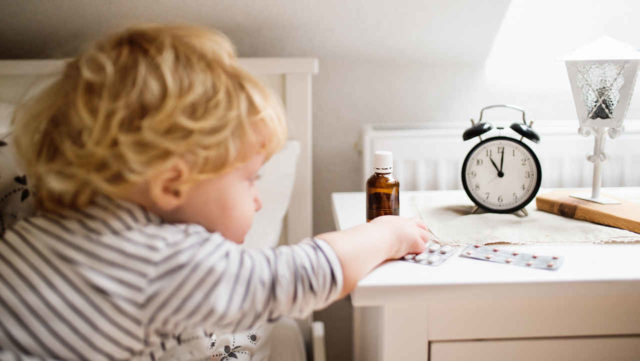 Most poisonings occur at home and are preventable. Here’s how to reduce the risk.
Most poisonings occur at home and are preventable. Here’s how to reduce the risk.
More than 90% of all poisonings happen at home. Poisoning affects people of all ages, although children under age 6 are most likely to be accidentally poisoned and account for nearly half of all calls made to poison control centers. Prescription drug overdose is the leading cause of poisoning across all age groups, but in children ages 6 and under, cosmetics and personal care products top the list.
“Accidental ingestions are a common (and often avoidable) reason children end up in the doctor’s office or emergency room and can be extremely harmful. One way infants and small children learn and explore their world are by putting things in their mouth, and when common household items such as medication pills and laundry detergent pods are small and colorful, they resemble candy! Keeping medications in their original bottles also helps identify the medication if ingested, which can be extremely important for the medical team to know when caring for the child. Also helpful is to have some idea of how full pill bottles are so that the quantity lost/ingested can be easily calculated. If concerned that your child may have ingested something, call the poison control line or your doctor’s office immediately as some poisonings and ingestion are time-sensitive.”
Here are 8 tips for poison-proofing your home:
- Store all prescription and over-the-counter medicine in a locked cabinet. Do the same for vitamins and supplements, which can also be harmful.
- Follow directions carefully on all medication and read warning labels.
- Beware of medication, cosmetics and other small items left in purses/bags. Items containing button batteries are especially dangerous. About 3,000 kids go to the ER each year after swallowing these batteries, which can lead to permanent damage in as little as 2 hours. Children can easily get to items left in purses and swallow them before anyone notices.
- Keep cosmetics, perfumes and personal care products where children can’t see or reach them. These colorful items attract kids’ attention and can be very dangerous if swallowed.
- Keep medicine, cleaners, chemicals, oils and other potential poisons in their original containers so you know what they are. This makes it less likely that they will be mistaken for something else.
- Store all chemicals, such as household cleaners, detergents, automotive products, and pesticides, in a securely locked cabinet, out of the reach of children. Never underestimate your child’s ability to climb.
- Never keep potential poisons in the same place you keep food. Children and seniors especially can mistake dangerous items for something they can eat.
- Get rid of unused or expired medication by bringing it back to the pharmacy. Do not save medicine you no longer need. If you toss medicine in your trash, first mix it with coffee grounds or kitty litter so it won’t be picked out of the garbage.
Here are some signs that poisoning may have occurred:
- Nausea and vomiting
- Cramps
- Dizziness
- Foaming or burning around the mouth
- Difficulty breathing
- Unconsciousness
If you suspect that someone has been exposed to something potentially poisonous, call the National Poison Control Hotline at 1-800-222-1222 or your local poison control center. If the person is unconscious or is not breathing, call 911.
Copyright 2020 © Baldwin Publishing, Inc. All rights reserved.
Health eCooking® is a registered trademark of Baldwin Publishing, Inc. Cook eKitchen™ is a designated trademark of Baldwin Publishing, Inc. Any duplication or distribution of the information contained herein without the express approval of Baldwin Publishing, Inc. is strictly prohibited.
Date Last Reviewed: January 7, 2020
Editorial Review: Andrea Cohen, Editorial Director, Baldwin Publishing, Inc. Contact Editor
Medical Review: Perry Pitkow, MD
Learn more about Baldwin Publishing Inc. editorial policy, privacy policy, ADA compliance and sponsorship policy.
No information provided by Baldwin Publishing, Inc. in any article is a substitute for medical advice or treatment for any medical condition. Baldwin Publishing, Inc. strongly suggests that you use this information in consultation with your doctor or other health professional. Use or viewing of any Baldwin Publishing, Inc. article signifies your understanding and agreement to the disclaimer and acceptance of these terms of use.